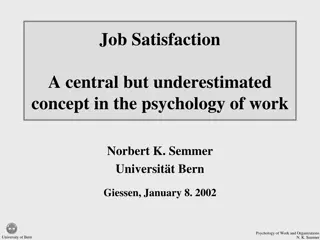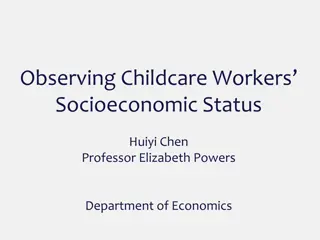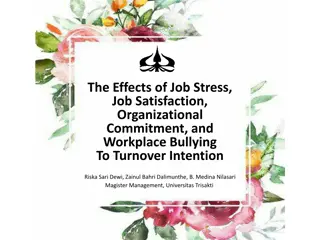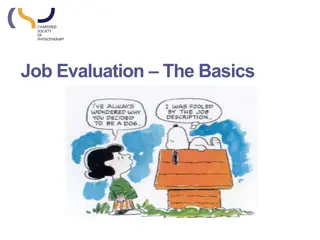Factors Influencing Job Satisfaction Among Workers at Panteion University
Explore the presentation by Olympia Kaminioti, Ph.D., on the various factors affecting job satisfaction among workers at Panteion University in Athens, Greece. The session delves into the importance of job satisfaction, previous research findings, demographics affecting satisfaction levels, and preliminary data analysis from the European Skills & Jobs Survey. Discover the correlation between individual measures and work quality, and implications for research and policy.
Download Presentation

Please find below an Image/Link to download the presentation.
The content on the website is provided AS IS for your information and personal use only. It may not be sold, licensed, or shared on other websites without obtaining consent from the author.If you encounter any issues during the download, it is possible that the publisher has removed the file from their server.
You are allowed to download the files provided on this website for personal or commercial use, subject to the condition that they are used lawfully. All files are the property of their respective owners.
The content on the website is provided AS IS for your information and personal use only. It may not be sold, licensed, or shared on other websites without obtaining consent from the author.
E N D
Presentation Transcript
InGRID March 28th, 2019 Panteion University Olympia Kaminioti, Ph.D. National Institute of Labour and Human Resources Athens, Greece
More and less satisfied workers: which are the differentiating factors? Outline of the presentation Why focus on job satisfaction? Previous research Data Analysis Preliminary results Conclusions Implications for research Implications for policy 2
More and less satisfied workers: which are the differentiating factors? Why focus on job satisfaction? Why judge working conditions with individual (subjective) measures and not with objective measures (% of part-time, etc.)? Individual measures do matter. They correlate with observable phenomena including labour market behaviour. One of the determinants of life satisfaction is job satisfaction. Job satisfaction relates to: individual well-being and business outcomes (productivity, profitability, etc.). Job satisfaction informs us about important aspects of the quality of work. It provides a way to identify inequalities. 3
More and less satisfied workers: which are the differentiating factors? Previous research Demographics: age (U shaped), gender (conflicting), family status (married positive r), education-skills (complicated), working conditions: wages level and prospect of change, stability, supervisory duties, fixed term - high job satisfaction, hours, stress at work, monotony, physical effort low job satisfaction, psychological: motivation, self-esteem, personality characteristics correlated with job satisfaction. 4
More and less satisfied workers: which are the differentiating factors? Data European Skills & Jobs Survey (ESJS), CEDEFOP 1st wave, 2014 The Greek sample consists of: 2037 adult (24-65 years old) employees 5
More and less satisfied workers: which are the differentiating factors? Preliminary analysis Comparison of means Chi-square analysis Profile of very satisfied and very unsatisfied employees OLS 6
More and less satisfied workers: which are the differentiating factors? Preliminary results-1 Demographics Gender Job satisfaction Significance - Age ** 24-39 40-54 55-64 6.70 7.00 7.60 Education - Family status - Nationality GR Other ** 6.83 7.25 7
More and less satisfied workers: which are the differentiating factors? Preliminary results-2 Job satisfaction 6.70 6.93 Significance * Part-time Full-time Non permanent contract Permanent contract 6.65 6.98 ** Working hours - Type of organization NGO Private Public 6.62 6.81 7.07 ** Size of organization - Occupation Elementary occupations Managers 6.29 7.53 ** Salary Absolute Relative (quartiles) * ** 8
More and less satisfied workers: which are the differentiating factors? Preliminary results-3 Job characteristics 1 Job satisfaction Significance Possibility of loosing job Very likely very unlikely 6.26-7.59 ** Tenure 1-2 years 3-9 years 10-20 years 21+ years ** 6.60 6.86 7.10 7.22 Promotion No Yes 6.74 7.48 ** 9
More and less satisfied workers: which are the differentiating factors? Preliminary results-4 Job characteristics 2 Job satisfaction Significance Choice in performing job Never - always 6.48-7.40 ** Team work Never - always 6.55-7.13 ** Routine tasks - 10
More and less satisfied workers: which are the differentiating factors? Preliminary results-5 Skills Outdated skills Very likely very unlikely Job satisfaction Significance 6.26-7.04 ** Learning at work Never - always 6.13 - 7.37 ** Matching skills for job 4 categories 5.37-7.01 ** Change of skills Worse Same Better 5.36 6.08 7.02 ** 11
More and less satisfied workers: which are the differentiating factors? Preliminary results-6 Differences between very unsatisfied and very satisfied employees Perhaps the most striking difference is the lack of difference in certain variables Striking difference with respect to security, quality of work, skill development and mismatch 12
More and less satisfied workers: which are the differentiating factors? Preliminary results-7 OLS results R2 adj=10% Significant coefficients: promotion, routine, learning, choice, team, security, skill mismatch Not significant coefficients: age, gender, marital status, nationality, education, fulltime/part-time, permanent/non permanent contract, public/private/ngo, tenure, salary 13
More and less satisfied workers: which are the differentiating factors? Conclusions Overall high job satisfaction levels Lower compared to some other countries Happy to have a job during the crisis? For the study of inequality relative numbers matter More importantly, determinants of job satisfaction are of interest Individual measures are important but caution is necessary in the interpretation of results. 14
More and less satisfied workers: which are the differentiating factors? Implications for research Sector specific analyses are required. The timing of the survey is important (crisis). Self-employed, other categories need not be excluded. Linear specification may not be the most appropriate. Direct and indirect effects Bi-directional effects Education may have direct and indirect effects. Education increases options for finding a better job and choices on how to do a certain job; over- education matters; skill mismatch matters. 15
More and less satisfied workers: which are the differentiating factors? Implications for policy Job satisfaction may highlight some aspects of inequalities in the labour market, but some people may have lower expectations . Job satisfaction has to do with expectations and experiences: What you obtain what you expect Complex concept Job satisfaction may highlight some aspects of inequalities both in terms of expectations and experiences. 16
More and less satisfied workers: which are the differentiating factors? Thank you olympiakaminioti@gmail.com 17























